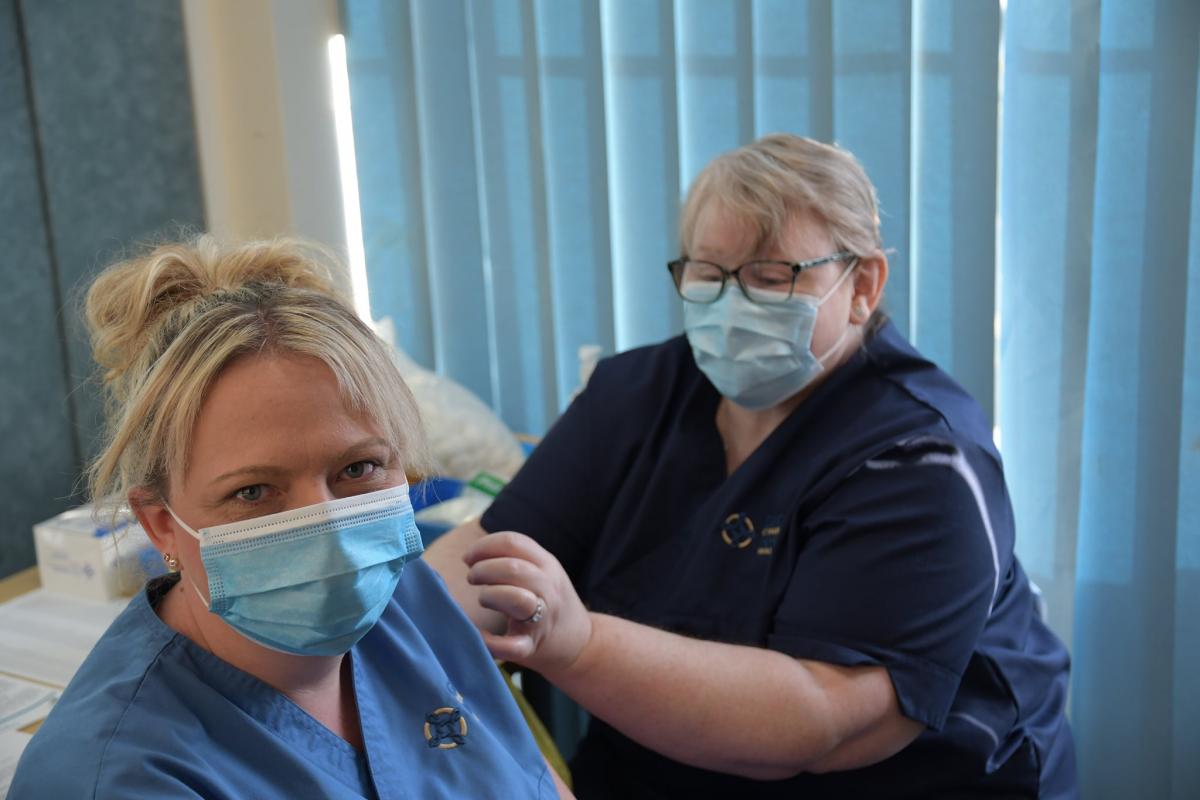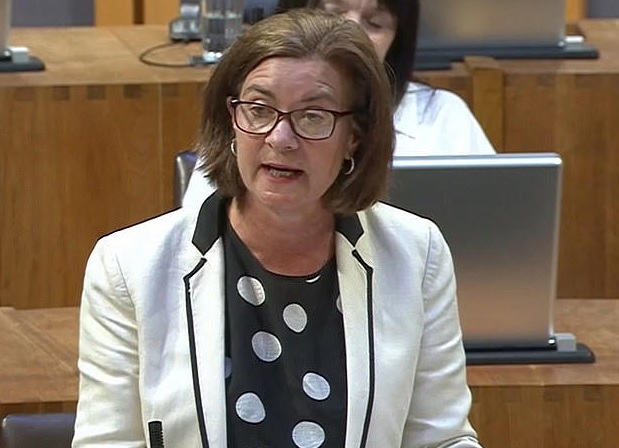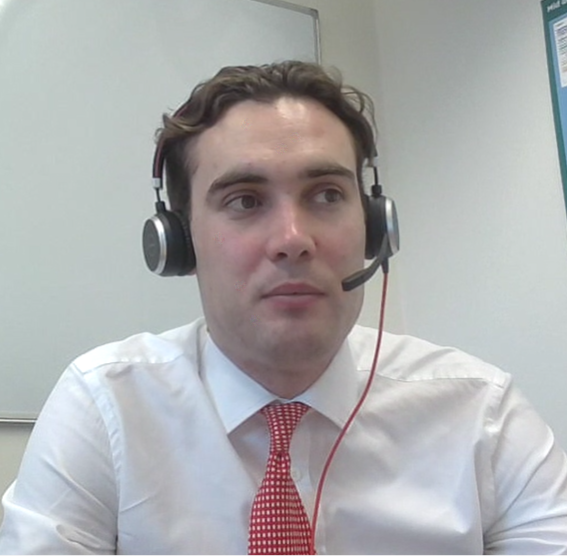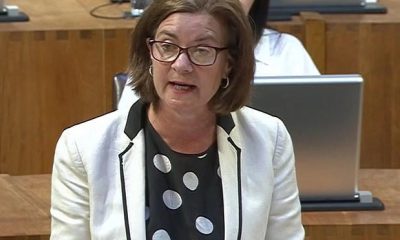News
Vaccine-sceptic care workers urged to get jabbed to save lives

A SOCIAL CARE leader has urged the minority of vaccine-sceptic care workers in the Hywel Dda Health Authority area to get fully jabbed as a matter of urgency.
According to Mario Kreft MBE, it was a “life or death” decision because of the potential dangers posed by the newly-identified Omicron super variant of Covid-19.
The new variant was first reported in South Africa last Wednesday and the early evidence suggests it has a higher re-infection risk.
Experts warn that it appears to spread “very rapidly” and that it can be spread between people who are double vaccinated.
It’s feared the vaccines could be less effective against the new variant, although partially or fully jabbed people were less likely to be become seriously ill.
Mr Kreft is calling on care workers and other to go for their booster jab as soon as they are eligible.
Another concern for Care Forum Wales is that any increase in community transmission could trigger another “pingdemic”, leading to greater staff shortages at the time when the sector was already struggling.
Mr Kreft said: “Having a booster jab is the one thing that people can do to play their part to combat this horrible super variant.
“Our staff have been heroic throughout the pandemic and they have risen magnificently to the unprecedented challenges of keeping people safe.
“This is the time when the whole community can do their bit but it’s especially important that people who work in care homes or in domiciliary care have their third jab.
“The reason it’s so important for people in social care to be triple jabbed is blindingly obvious because by definition they are looking after the most vulnerable people in society, those who more often than not have serious underlying health conditions that make them uniquely susceptible.
“Overwhelmingly, the staff working in social care have now had all the necessary jabs but there is still a small minority that have not been fully vaccinated or not vaccinated at all in some cases.
“It is their right not to be vaccinated but it’s now a real issue of concern with the new Omicron variant which appears to be so much more transmissible.
“It presents a whole set of new risks for care homes and domiciliary care so it’s imperative we all do the right thing.
“We’re now involved in a race against time against a new and potentially extremely dangerous super variant.
“We won’t know the full extent of the dangers for a few weeks but if we wait until then it could be too late and people will die. That’s the bottom line.
“I cannot stress enough how important this is – it could be a matter of life and death for the incredibly vulnerable people for whom we provide care and for our staff too.
“In the meantime, the scientific advice is clear and unequivocal – we need to vaccinate vulnerable people and those close to them.
“Even people who have been double jabbed may not be safe so having the booster will provide the best possible protection that’s currently available to us. The booster is the only game in town.
“The people at most risk are the unvaccinated and they are the ones most likely to spread the disease.
“We do not have any room for complacency so we need to do everything we can to ensure that the people who work with vulnerable people get the booster.
“The vaccine programme has been fantastic. Most people have got their residents boosted and the majority of staff have also had the third jab so that’s been a big success.
“It’s vitally important that those remaining people in care homes and domiciliary care workers who’ve been sceptical are encouraged to get their jabs.
“Everybody has now had the opportunity to be vaccinated so there is no excuse now not to have three jabs.”
“At the same time, we also need to ensure that we have adequate cover on the front line.
“The sector is already suffering from the worst staff shortage in living memory.
“The last thing we need now is to lose more care workers as a result of a new pingdemic.
“We need to devise a system to ensure that staff are not side-lined unnecessarily whilst keeping people safe.”
News
Political leaders and unions react to Milford Haven school assault

First Minister, MP, MS and teaching unions call for safety and support for staff
POLITICAL leaders and teaching unions across Wales have spoken out following Thursday’s assault on a teacher at Milford Haven School, which led to a lockdown, a major police response and the arrest of a 15-year-old boy on suspicion of attempted murder.
The First Minister Eluned Morgan said she was “deeply concerned” by the incident and stressed that violence had no place in Welsh schools.

Her comments come just days after she visited the Milford Haven campus following the school being placed into special measures by Estyn, where she met leaders to discuss improvement plans and support arrangements.
She said her thoughts were with the injured teacher, their family and the wider school community, and praised the swift response of staff and emergency services.

Local MP Henry Tufnell, who represents Carmarthen West and South Pembrokeshire, described the incident as deeply upsetting for what he called a close-knit community.
He said he was thinking of the teacher and pupils affected and thanked Dyfed-Powys Police and ambulance crews for their professionalism.
Meanwhile Senedd Member Samuel Kurtz said: “Deeply concerning news across the water in Milford Haven.
“Sadly, violence in our schools is becoming all too common, and thanks must go to the emergency services for their timely response. Thoughts are with the injured teacher, their family and the wider school community.”
Leader of the Welsh Conservatives Andrew RT Davies said teachers must feel safe at work and called for continued support for school staff.
Teaching unions also responded.
NASUWT said teachers “deserve to feel safe in their workplace” and that any violence against staff must be taken seriously, while National Education Union said schools must remain safe spaces for both pupils and staff and urged continued focus on safeguarding and behaviour support.
All said support would be offered to the Milford Haven school community in the days ahead as police investigations continue.
Crime
Teacher discharged as police step back from Milford Haven school after assault

Teenager remains in custody as school closes and patrols increased to reassure community
POLICE have confirmed they are no longer stationed at Milford Haven School after a teacher was assaulted by a pupil on Thursday afternoon (Feb 5), as the injured member of staff has now been discharged from hospital.
In a joint statement issued by Dyfed-Powys Police, Pembrokeshire County Council and Hywel Dda University Health Board, Superintendent Chris Neve said swift action had been taken to protect pupils and staff.
He said: “Police are no longer in attendance at Milford Haven Comprehensive School, following a report of the assault of a teacher at approx. 3.20pm this afternoon.
“I would like to reassure parents, and the wider community, that swift action was taken to both safeguard pupils and teachers, and to trace the suspect as soon as this report was received.
“The teacher has now been discharged from hospital and is being supported by specialist officers. All pupils at the location were safe, and all returned home unharmed. A 15-year-old boy has been arrested and remains in police custody as enquiries continue.
“You will see a higher than usual police presence in the area over the coming days – these will be dedicated patrols to provide further reassurance.”
The injured teacher was earlier taken to hospital by road ambulance.
An immediate lockdown was put in place at the school while emergency services responded. Most pupils had already left for the day, but those still on site were secured inside classrooms and offices as a precaution.
School closed on Friday
Council leader Cllr Jon Harvey said the school would be closed to pupils on Friday to allow support and safety measures to continue.
He said: “We would like to thank staff and pupils at Milford Haven School for implementing a swift and effective lockdown in response to this incident.
“While the school will be closed to pupils tomorrow, if there are any learners who require additional support they are welcome to attend and there will also be support for staff on site.
“We’d like to reassure learners and parents, along with the wider community, that all measures to ensure safety are being taken.”
The health board added that anyone needing urgent mental health support can call NHS 111 and press option 2 for 24-hour assistance.
National spotlight
The incident has drawn national media attention.
BBC News broadcast live from the school gates during its Ten O’Clock News bulletin, while ITV News and several national titles also covered developments.
Journalists from a number of UK outlets, including The Sun, contacted The Herald as events unfolded, with several Welsh and national publishers using photographs first taken by Herald reporters.
Residents said the scale of coverage was unprecedented for the normally quiet port town.
Police enquiries are continuing.
Photo caption:
Police outside Milford Haven School following Thursday’s incident (Pics: Herald).
Health
Health board targets rise in steroid and gym drug use across west Wales

THE LOCAL health board has launched new targeted measures after recording a sharp rise in the use of steroids and other image-enhancing drugs across the region.
Hywel Dda University Health Board says needle exchange figures show significant growth over the past two years in people seeking support related to Image and Performance Enhancing Drugs (IPEDs), including anabolic steroids and so-called Selective Androgen Receptor Modulators (SARMs).
SARMs, while marketed online as safer alternatives to steroids, are illegal to sell in the UK and health professionals warn they carry serious and largely unknown risks.
The health board has now teamed up with Dyfed Drug and Alcohol Service (DDAS) and Choices, a young people’s substance use service, to tackle what officials describe as an “emerging public health challenge”.
Workshops and outreach
Two key initiatives have been introduced.
Educational workshops are being delivered to young people, focusing on the risks of using performance-enhancing substances during physical development and the potential long-term effects on hormones, mental health and fertility.
At the same time, enhanced support is being offered to people already involved in gym and fitness culture, with harm-reduction advice, health monitoring and confidential drop-in services.
Support includes testosterone testing, blood checks, cycle provision kits and discreet one-to-one consultations.
One service user described the programme as “quick, professional and non-judgemental”.
They said: “The drop-in clinic for my blood test was really convenient. I was seen quickly and given a full run-down of the services available. The staff made me feel comfortable the whole time and I got my results back faster than expected.”
Taking support into the community
The team has also worked directly with local gyms, leisure centres and sports venues, speaking to more than 100 people during five outreach sessions.
Twelve DDAS staff members have completed specialist IPED training delivered by Public Health Wales to strengthen expertise within the service.
Rachel Wilson, Resilient Families Manager at Choices, said the aim is to reduce stigma.
She said: “We’re proud to work alongside Hywel Dda to ensure people who use IPEDs are met with understanding, not judgement. These initiatives are helping us reach individuals who may not have previously considered accessing support.”
Craig Jones, Prevention and Population Health Improvement Manager, added: “This work is about meeting people where they are. By listening and responding with compassion and evidence-based care, we’re making a real difference.”
Dr Ardiana Gjini, Executive Director of Public Health, said the approach showed the board’s commitment to early intervention.
She said: “These initiatives reflect a proactive, collaborative response to emerging health challenges and demonstrate our dedication to protecting the health of our communities.”
Anyone seeking confidential advice or support can contact DDAS on 03303 639997 to book an appointment.
-

 Crime1 day ago
Crime1 day agoSex offender jailed after living off grid in Pembrokeshire and refusing to register
-

 Health14 hours ago
Health14 hours agoHealth board targets rise in steroid and gym drug use across west Wales
-

 News3 days ago
News3 days agoPrincess of Wales visits historic Pembrokeshire woollen mill
-

 Crime7 days ago
Crime7 days agoPembroke man accused of child sex offences sent to Swansea Crown Court
-

 Health4 days ago
Health4 days agoDoctor struck off after sexual misconduct findings at Withybush Hospital
-

 Crime16 hours ago
Crime16 hours agoTeacher injured and teenager arrested for attempted murder at Milford Haven School
-

 Community7 days ago
Community7 days ago50s women threaten legal action over pension compensation refusal
-

 Education6 days ago
Education6 days agoIndustry insight helps marine cadets chart career course





























